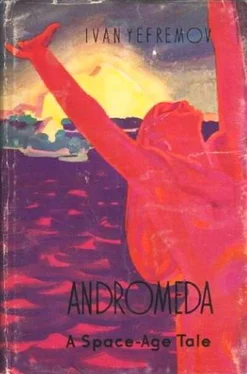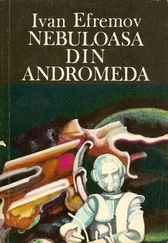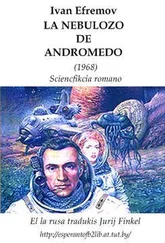Ivan Yefremov - Andromeda (A Space-Age Tale)
Здесь есть возможность читать онлайн «Ivan Yefremov - Andromeda (A Space-Age Tale)» весь текст электронной книги совершенно бесплатно (целиком полную версию без сокращений). В некоторых случаях можно слушать аудио, скачать через торрент в формате fb2 и присутствует краткое содержание. Город: Moscow, Год выпуска: 1959, Издательство: FOREIGN LANGUAGES PUBLISHING HOUSE, Жанр: Фантастика и фэнтези, на английском языке. Описание произведения, (предисловие) а так же отзывы посетителей доступны на портале библиотеки ЛибКат.
- Название:Andromeda (A Space-Age Tale)
- Автор:
- Издательство:FOREIGN LANGUAGES PUBLISHING HOUSE
- Жанр:
- Год:1959
- Город:Moscow
- ISBN:нет данных
- Рейтинг книги:5 / 5. Голосов: 1
-
Избранное:Добавить в избранное
- Отзывы:
-
Ваша оценка:
- 100
- 1
- 2
- 3
- 4
- 5
Andromeda (A Space-Age Tale): краткое содержание, описание и аннотация
Предлагаем к чтению аннотацию, описание, краткое содержание или предисловие (зависит от того, что написал сам автор книги «Andromeda (A Space-Age Tale)»). Если вы не нашли необходимую информацию о книге — напишите в комментариях, мы постараемся отыскать её.
Andromeda (A Space-Age Tale) — читать онлайн бесплатно полную книгу (весь текст) целиком
Ниже представлен текст книги, разбитый по страницам. Система сохранения места последней прочитанной страницы, позволяет с удобством читать онлайн бесплатно книгу «Andromeda (A Space-Age Tale)», без необходимости каждый раз заново искать на чём Вы остановились. Поставьте закладку, и сможете в любой момент перейти на страницу, на которой закончили чтение.
Интервал:
Закладка:
In order to economize the precious anameson and save the ship from carrying unwieldy equipment, communications inside the solar system were effected by ion planet-ships. Their speed did not exceed 800,000 kilometres an hour for the inner planets and 2,500,000 kilometres an hour for the most distant outer planets. The usual trip from Neptune to Earth took two and a half to three months.
Triton was a very big satellite, only a little smaller than the huge third and fourth satellites of Jupiter, Ganymede and Callisto, or the planet Mercury. It therefore possessed a thin atmosphere consisting mainly of nitrogen and carbon monoxide.
Erg Noor lauded the spaceship at the appointed place at the satellite’s pole, far from the broad domes of the station buildings. On a ledge of the plateau, near a cliff that was honeycombed with underground premises, stood the gleaming glass building of the quarantine sanatorium.
Here the travellers were subjected to a five-week quarantine in complete isolation from all other people. In the course of this time skilled doctors would study their bodies to make sure that no new infection had taken root. The danger was too great to be ignored: every person who had landed on another planet, even on an uninhabited one, had to submit to this inspection no matter how long he had afterwards been confined to the spaceship. The interior of the ship itself was also inspected by the sanatorium’s scientists before the station gave permission for the journey to Earth. Those planets that had been studied long before and had been colonized by man, such as Venus and Mars, as well as some of the asteroids, had their own quarantine stations where travellers were examined before the ships left.
Confinement in the sanatorium was easier than in the spaceship. There were laboratories in which to work, concert halls, combined baths using electric currents, music, water and wave oscillations, daily walks in light protective suits in the hills near the sanatorium, and, lastly, there was contact with Earth, not always regular, but, still, Earth was only five hours away!
Nisa’s silicolloid sarcophagus was carried into the sanatorium with every possible precaution. Erg Noor and the biologist Eon Thal were the last to leave Tantra. They moved easily even though wearing weights to prevent their making sudden leaps in the low gravitation on the satellite.
The floodlights around the landing fieldwere extinguished. Triton was moving across Neptune’s daylight side. Dull as the greyish light reflected by Neptune was, the giant mirror of the planet, only 35,000 kilometres away from Triton, dispelled the gloom and gave the satellite a bright twilight like that of a spring evening in the northern latitudes of Earth. Triton revolved about Neptune in the opposite direction to the planet’s revolution, that is, from east to west, once in about six terrestrial days so that the “daytime” twilight lasted about seventy hours. In that time Neptune revolved about its own axis four times and at the moment of their arrival the shadow of the satellite was noticeable as it crossed the nebulous disc.
Almost simultaneously the commander and the biologist noticed a small ship standing near the edge of the plateau. This was not a spaceship with its stern half broader than the bows and with high stabilizer ribs. Judging by the sharp bows and slim hull it must have been a planetship but its contours differed in the thick ring at the stern and the long, distaff-shaped structure on top.
“There’s another ship here in quarantine?” half asked, half asserted Eon. “Can the Council have changed its rules?”
“Not to send out stellar expeditions before a previous one has returned?” asked Erg Noor in his turn. “We have kept to our schedule but the report we should have sent to Earth from Zirda was two years late.”
“Perhaps it is an expedition to Neptune,” suggested the biologist. They soon covered the two kilometres to the sanatorium and climbed up to a wide terrace faced with red basalt. The tiny disc of the Sun, easily visible from the pole of the non-rotating satellite, shone brighter than any other star in the black sky. The bitter frost, — 170 °C., felt like the ordinary cold of a northern winter on Earth through their heated protective suits. Huge flakes of snow, frozen ammonia or carbon monoxide, fell slowly through the still atmosphere, giving their surroundings the serene appearance of Earth during a snow-fall.
Erg Noor and Eon Thal stared hypnotized at the falling snow-flakes as did their distant ancestors in the northern lands for whom the first snow-fall meant the end of the farm year. And this unusual snow also meant the end of their journey and their labours.
The biologist, in response to a subconscious impulse, held out his hand to the commander.
“Our adventures are over and we are still alive and well — thanks to you!”
Erg Noor made an abrupt gesture repelling his hand. “Are we all well? And thanks to whom am I alive?” Eon Thal was not put out.
“I’m sure Nisa will be saved! The doctors here want to begin treatment immediately. Instructions have been received from Grimm Schar himself, you know, the head of the General Paralysis Laboratory.”
“Do they know what it is?”
“Not yet. But Nisa has obviously been struck by some sort of current that condenses in the nerve nodes of the autonomous systems. When we find out how to put a stop to its extraordinarily long action the girl will be cured. We have discovered the functioning of persistent psychic paralysis that was considered incurable for centuries, haven’t we? This is something similar caused by an outside exciter. We’ll carry out some experiments on my prisoners, whether they are dead or alive, then… my arm will also begin to function again!”
The commander felt ashamed and frowned; in his great sorrow he had forgotten how much the biologist had done for him. Not at all decent in a grown man! He took the biologist’s hand and they expressed their warm friendship in man’s age-old handshake.
“Do you think the lethal organs of the black jelly-fish and that — that cross-shaped abomination are of the same order?” asked Erg Noor.
“I don’t doubt it, my arm tells me that. Adaptation to life in these black creatures, inhabitants of a planet rich in electricity, has taken the form of the accumulation and transformation of electric energy. They are obviously beasts of prey but we still don’t know whom they prey on.”
“But do you remember what happened to us all when Nisa….”
“That’s another thing. I have thought a lot about that. When that awful cross appeared it radiated infrasonic waves of tremendous strength that broke down our willpower. Sounds in that black world are also black and we cannot hear them. This monster dulls the consciousness with infrasonic effects, and then uses a sort of hypnosis much stronger than that once used by the now extinct big terrestrial snakes, like the anaconda, for example. That was what nearly finished us — if it had not been for Nisa….”
Erg Noor looked at the distant Sun that was at that moment also shining on Earth. The Sun is man’s eternal hope, has been since the prehistoric days when man dragged out a pitiful existence in the teeth of ruthless nature. The Sun is the incarnation of the bright forces of the intellect driving away the darkness and the monsters of the night. And a joyful spark of hope went with him for the rest of his journey.
The Director of the Triton Station came to see Erg Noor at the sanatorium to tell him that Earth wanted to speak to him. The Director’s appearance in a building that was in strict quarantine meant that their isolation was over and that Tantra would be able to complete her thirteen-year journey. Erg Noor came back looking more business-like than ever.
Читать дальшеИнтервал:
Закладка:
Похожие книги на «Andromeda (A Space-Age Tale)»
Представляем Вашему вниманию похожие книги на «Andromeda (A Space-Age Tale)» списком для выбора. Мы отобрали схожую по названию и смыслу литературу в надежде предоставить читателям больше вариантов отыскать новые, интересные, ещё непрочитанные произведения.
Обсуждение, отзывы о книге «Andromeda (A Space-Age Tale)» и просто собственные мнения читателей. Оставьте ваши комментарии, напишите, что Вы думаете о произведении, его смысле или главных героях. Укажите что конкретно понравилось, а что нет, и почему Вы так считаете.











